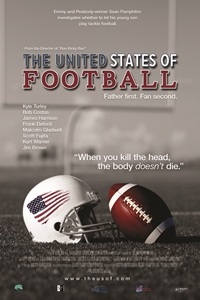THE AISLE SEAT - by Mike McGranaghan
"THE UNITED STATES OF FOOTBALL"

Last year, I reviewed a movie called Head Games that examined the impact of traumatic head injury in sports. It concluded that repeated head injury through football, soccer, boxing, hockey, what have you leads to long-term problems like dementia, violent behavior, and depression. The new documentary The United States of Football takes that idea and runs with it, focusing specifically on the impact of such injuries in football. Director Sean Pamphilon achieved notoriety in 2012, when he leaked recordings of former New Orleans Saints defensive coordinator Gregg Williams commanding his players to injure certain members of the opposing team, including one player who'd suffered a concussion. It's quite clear that Pamphilon has deep feelings about this issue. After seeing his film, you will too.
The United States of Football uses former Saints player Kyle Turley as its centerpiece. Turley, who is now a full-time musician, suffers from a seizure disorder caused by too many concussions throughout his career. He is also an activist fighting to bring more attention to the issue. One of Turley's friends was former Pittsburgh Steeler Justin Strzelczyk, who died after driving his pickup truck the wrong way in traffic and crashing into a tanker truck at 90MPH. An autopsy found brain damage from multiple career concussions that likely caused Strzelczyk's severe depression and erratic behavior. We also hear from the wives of several other former players, each discussing the changes they have seen in their husbands in the wake of documented brain damage. Medical experts, including Dr. Robert Cantu from Boston University's Center for the Study of Chronic Traumatic Encephalopathy, testify that even the sturdiest football helmets don't prevent the brain from being bashed around inside the skull, and that's where things become problematic.
Pamphilon's documentary indicates that the NFL knew about the hazards of head trauma for decades, yet did everything possible to hide it from the players who were at risk. The reason for this is simple: money. Fans come to see hardcore pigskin action. Remove that and they potentially lose interest, which means the NFL loses money. (If you don't believe fans are really watching in anticipation of seeing guys go rough on each other, just ask one of them how they'd feel if tackling was eliminated from the sport. Or, if you're a football buff, ask yourself that question.) The filmmaker repeatedly attempts to get an interview with NFL commissioner Roger Goodell to ask him why neurologists aren't mandatory on the sidelines. Veteran newscaster Bob Costas, who is interviewed here, says Goodell is a smart man and has to understand the importance of the issue. This begs the question: Why has the NFL been so slow in protecting its players?
When The United States of Football veers away from the NFL, it does so to explore the potential hazards of head injury in young players. The film makes the very good point that youth league coaches are rarely trained; they're just guys who played football themselves as kids. This mindset often encourages the coaches to push the same ideals that were pushed on them the same ones the NFL pushes on its players: hit the other guy as hard as you can, shake off your injuries, get back in the game, etc. For most people, the crunch is what football is all about, so you end up with adults encouraging kids to replicate major league play. It's a terrifying thought, one that should give great pause to any parent whose child expresses an interest in the sport.
All of this is very sobering. Even if you neither know nor care about football (and for the record, I don't), USOF is still a riveting, important film. Maybe your child wants to play football. Maybe you have a loved one who participates in the sport. Or maybe, like the truck driver Justin Strzelczyk crashed into, you'll be on the wrong end of some unpredictable behavior performed by an athlete who has suffered too many knocks in the head.
On another level, The United States of Football is so engrossing simply because it puts a magnifying glass above a prominent culture. The title says it all. Football is nothing less than revered in our country. It means a great deal to many people. In fact, football is more than a game; it's a way of life. Generations of families are raised supporting a particular team. The sport also engenders a sense of belonging (as evidenced by fans saying we won the game, even when they were sitting on a couch eating Cheetos). Anything that threatens the current state of football does so at its own risk. That traumatic head injury is currently threatening football is something we all need to pay attention to. Will the NFL, which has consistently been slow to act in response to this threat, continue to sell out its most valuable asset the players to maintain the status quo? And if they do, should we let them? The United States of Football asks these questions, and others, forcefully and unflinchingly. And it does so while putting a human face on the problem.
Do not miss this provocative film.
The United States of Football is available on iTunes.
(![]()
![]()
![]() 1/2 out of four)
1/2 out of four)
The United States of Football is unrated, but contains adult language. The running time is 1 hour and 42 minutes.
Buy a copy of my book, "Straight-Up Blatant: Musings From The Aisle Seat," on sale now at Lulu.com! Paperback and Kindle editions also available at Amazon.com!


